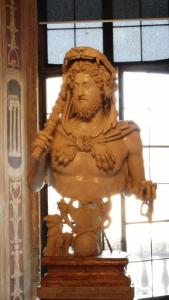[Earlier we posted a passage contrasting the virtue of Marcus Antoninus (Aurelius) with the vice of his son Commodus. here’s the rest.]
“Some men report a thing which seems likely, that Commodus Antoninus, his son and successor, was born not from him but from adultery and they support such a tale with a common rumor. There was a time when Faustina, Pius’ daughter and Marcus’ wife, saw some gladiators pass and was set afire with love for one of them. Later, when she was suffering from a long sickness, she told her husband about this. When Marcus relayed this to the Chaldaeans, their advice was that he should have Faustina bathe herself in the blood of the killed gladiator and then lie with her husband. When this act was complete, the passion was quenched, though their son Commodus was as a result born to be a gladiator not a princeps. This tale is treated as likely since there was never a son of a prince so virtuous with ways worse than a gladiator master, a street-actor or some arena-fighter, a man who could summon up a trophy of crimes from a surfeit of blessings.
Many others, however, claim that Commodus was really conceived through adultery because it is known that when Faustina was at Caieta she would choose lovers from the sailors and the gladiators. When this was mentioned to Marcus Aurelius so that he would reject her or kill her, he is reported to have replied, “If I divorce my wife, I must return her dowry.” And what did he consider her dowry but the empire which he had received when he was adopted by his father-in-law at Hadrian’s urging.”
Aiunt quidam, quod et verisimile videtur, Commodum Antoninum, successorem illius ac filium, non esse de eo natum sed de adulterio, ac talem fabellam vulgari sermone contexunt. 2 Faustinam quondam, Pii filiam, Marci uxorem, cum gladiatores transire vidisset, unius ex his amore succensam, cum longa aegritudine laboraret, viro de amore confessam. 3 Quod cum ad Chaldaeos Marcus rettulisset, illorum fuisse consilium, ut occiso gladiatore sanguine illius sese Faustina sublavaret atque ita cum viro concumberet. 4 Quod cum esset factum, solutum quidem amorem, natum vero Commodum gladiatorem esse, non principem, 5 qui mille prope pugnas publice populo inspectante gladiatorias imperator exhibuit, ut in vita eius docebitur. 6 Quod quidem verisimile ex eo habetur, quod tam sancti principis filius his moribus fuit, quibus nullus lanista, nullus scaenicus, nullus arenarius, nullus postremo ex omnium decorum ac scelerum conluvione concretus. 7 Multi autem ferunt Commodum omnino ex adultero natum, si quidem Faustinam satis constet apud Caietam condiciones sibi et nauticas et gladiatorias elegisse. 8 De qua cum diceretur Antonino Marco, ut eam repudiaret, si non occideret, dixisse fertur : “Si uxorem dimittimus, reddamus et dotem.” 9 Dos autem quid habebatur [nisi] imperium, quod ille ab socero volente Hadriano adoptatus acceperat?

